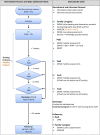DESKK Study - Development and testing of a dementia-specific respite care concept with a mobility and counselling programme: study protocol
- PMID: 31203237
- PMCID: PMC6588967
- DOI: 10.1136/bmjopen-2018-025932
DESKK Study - Development and testing of a dementia-specific respite care concept with a mobility and counselling programme: study protocol
Abstract
Introduction: Specific mobility programmes can delay functional decline in people with dementia (PwD). Family caregivers (FCs) can be relieved from care-related burden by counselling services. Respite care is a short-term inpatient care service (1-8 weeks of stay). Respite care centres (RCCs) can function as support structures for dementia care arrangements through caring-based mobility training of PwD and counselling sessions for their FCs. However, no systematic mobility or counselling programmes exist in this setting in Germany or the rest of the world. The aim of the development and testing of a dementia-specific respite care concept (DESKK) study is the development and testing of an evidence-based mobility and counselling programme for PwD and their FCs that is suitable for the respite care setting.
Methods and analysis: A pilot-based, quasi-experimental evaluation study will be conducted in a specialised RCC for PwD. To evaluate the acceptance and usability of the development and testing of a DESKK concept, qualitative data will be collected from the RCC staff and FCs via semistandardised interviews. Quantitative data will be collected using instruments to assess effect tendencies of the concept related to mobility (PwD) and burden (FCs). Furthermore, a mixed-methods triangulation approach will be conducted.
Ethics and dissemination: The protocol, informed consent and accompanying material given to patients were submitted by the investigator to the Ethical Review Committee of the German Society of Nursing Science. The project was examined and finally approved on 31 January 2017 (Number: 16-27). Prior to obtaining written consent for study participation, information must be given to all of the study participants in verbal and written form. The results of the study will be presented at national and international conferences and published in peer-reviewed journals. After the concept is finalised, a practice-friendly manual will be developed in which implementation components are described for other RCCs.
Trial registration number: NCT03578861.
Keywords: counseling; dementia; exercises; family caregivers; mobility; respite care.
© Author(s) (or their employer(s)) 2019. Re-use permitted under CC BY-NC. No commercial re-use. See rights and permissions. Published by BMJ.
Conflict of interest statement
Competing interests: None declared.
Figures



Similar articles
-
Feasibility of a mobility programme for people with dementia in the respite care setting: results of the DESKK study.BMC Geriatr. 2020 Sep 7;20(1):326. doi: 10.1186/s12877-020-01728-z. BMC Geriatr. 2020. PMID: 32894055 Free PMC article.
-
Effectiveness and cost-effectiveness of an in-home respite care program in supporting informal caregivers of people with dementia: design of a comparative study.BMC Geriatr. 2016 Dec 2;16(1):207. doi: 10.1186/s12877-016-0373-4. BMC Geriatr. 2016. PMID: 27912740 Free PMC article.
-
Formal support for informal caregivers to older persons with dementia through the course of the disease: an exploratory, cross-sectional study.BMC Geriatr. 2016 Jan 29;16:32. doi: 10.1186/s12877-016-0210-9. BMC Geriatr. 2016. PMID: 26832354 Free PMC article.
-
The influence of day care centres for people with dementia on family caregivers: an integrative review of the literature.Aging Ment Health. 2016;20(5):450-62. doi: 10.1080/13607863.2015.1023765. Epub 2015 Mar 27. Aging Ment Health. 2016. PMID: 25815563 Review.
-
Respite in Dementia: An Evolutionary Concept Analysis.Dementia (London). 2019 May;18(4):1446-1465. doi: 10.1177/1471301217715325. Epub 2017 Jun 28. Dementia (London). 2019. PMID: 28659025 Review.
Cited by
-
Feasibility of a mobility programme for people with dementia in the respite care setting: results of the DESKK study.BMC Geriatr. 2020 Sep 7;20(1):326. doi: 10.1186/s12877-020-01728-z. BMC Geriatr. 2020. PMID: 32894055 Free PMC article.
-
Development and validation of the respite care model for adults with cancer in Iran: study protocol for a multimethod research project.BMJ Open. 2025 Feb 7;15(2):e089349. doi: 10.1136/bmjopen-2024-089349. BMJ Open. 2025. PMID: 39920068 Free PMC article.
-
Identifying the Implementation Conditions Associated With Positive Outcomes in a Successful Nursing Facility Demonstration Project.Gerontologist. 2020 Nov 23;60(8):1566-1574. doi: 10.1093/geront/gnaa041. Gerontologist. 2020. PMID: 32440672 Free PMC article.
References
-
- WHO. Dementia - A public health priority. Geneva: WHO Press, 2012.
-
- WHO. The epidemiology and impact of Dementia. Current state and future trends: World Health Organization. 2015. https://www.who.int/mental_health/neurology/dementia/dementia_thematicbr... (Accessed 04 Apr 2019).
-
- Bickel H. Die Häufigkeit von Demenzerkrankungen. Informationsblatt 1. 2018. https://www.alzheimer-bayern.de/images/downloads/demenz/8_Zahlen/DAlzG_H... (Accessed 04 Apr 2019).
-
- Dassen T. Bundesweite Erhebung zu Pflegeproblemen. Berlin: Studie aus Pflegeheimen und Krankenhäusern; Charité, 2009.
-
- Shea T. Dementia - Understanding brain diseases and disorders. New York: Rosen Publishing, 2012.
Publication types
MeSH terms
Associated data
LinkOut - more resources
Full Text Sources
Medical
